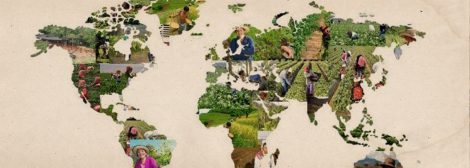With 33 votes in favor by the countries present at the 39th round of sessions, the UNHRC passed a resolution in Geneva, Switzerland, to adopt the Declaration on the Rights of Peasants that will now be discussed at the General Assembly of the multilateral body. The General Assemby needs to make a final decision before the end of the year about this tool, that according to La Vía Campesina represents a new horizon in terms of agrarian public policies.
The resolution was celebrated as an important victory by social movements and civil society organizations in Geneva and around the world, where the different regions of La Vía Campesina have been contributing to this outcome that reaffirms the need for a special treatment of food producers as guardians of Mother Earth and the territories.
Land tenure, fisheries, seeds, plant resources, collective rights and other elements are included in the declaration.
“Seventeen years of long and arduous negotiations later, peasants and other people working in rural areas are only a step away from having a UN Declaration that could defend and protect their rights to land, seeds, biodiversity, local markets and a lot more”, stated La Vía Campesina after the result of the vote was made public”.
“On Friday, 28 September, in a commendable show of solidarity and political will, member nations of United Nations Human Rights Council passed a resolution concluding the UN Declaration for the Rights of Peasants and Other People Working in Rural Areas”.
The resolution was passed with 33 votes in favor, 11 abstentions and 3 votes against it.
The following countries voted in favor of adopting the declaration: Afghanistan, Angola, Saudi Arabia, Burundi, Chile, China, Cote d’Ivoire, Cuba, Ecuador, Egypt, United Arab Emirates, Ethiopia, Irak, Kenya, Kirguistan, Mexico, Mongolia, Nepal, Nigeria, Pakistan, Panama, Peru, Phillipines, Qatar, Democratic Republic of Congo, Rwanda, Senegal, South Africa, Switzerland, Togo, Tunisia, Ukraine, Venezuela.
Meanwhile, Germany, Belgium, Brazil, Croatia, Slovakia, Slovenia, Spain, Georgia, Iceland, Japan and Korea abstained.
The negative votes came from Australia, Hungary and the UK.
A new legal framework
This UN Declaration can provide a global framework for national legislation and policies to:
- better protect the rights of peasants – women and men – and improve livelihoods in rural areas
- reinforce food sovereignty, the fight against climate change and the conservation of biodiversity
- take actions to implement comprehensive agrarian reform and a better protection against land-grabbing
- realize the right of peasants to conserve, use, exchange and sell their seeds
- ensure remunerative prices for peasant production and rights for agricultural workers
- recognize the rights of peasant women and bring about social justice for people of all origin, nationality, race, color, descent. Sex, language, culture, marital status, property, disability, age, political or other opinion, religion, birth or economic, social or other status without discrimination.
Ana María Vázquez Franco, human rights activist, expert on the right to adequate food and member of FIAN Internacional [1], said the decision represents a victory “because despite the fact that we feared we wouldn´t reach the votes necessary, we had the support of African and Asian countries, as well as most Latin American countries”.
Ana María shared an analysis of the outcome with RWR a few minutes after the approval was made known.
The next step is the adoption of the Declaration by the UN General Assembly in New York, US, which Ana María considers it foreshadows a “long process” whose first step will be on October 25th when this vote will be presented at the commission in charge of humanitarian issues.
After this, “the committee will vote again sometime between November 5th and November 21st. It is even possible that some countries will try to reopen the negotiations, perhaps due to the seeds issue. This negotiation will take place in New York, so the lobby and mobilization work by organizations is extremely important”.
If this vote is successful, then around Christmas, the General Assembly could finally approve the Declaration.
Meanwhile, Diego Montón, of the Latin American Coordination of Countryside Organizations, also shared an analysis of this significant first step, after almost two decades of mobilizations and work.
“We are extremely happy with this vote. We truly regret the decision by Brazil and its illegitimate government to abstain and to become the exception in Latin America”, said the peasant leader in an interview with Real World Radio.
Montón highlighted the “participatory and transparent” nature of the elaboration, discussion and approval process of the Declaration, and made reference to Bolivia and Bolivian President, Evo Morales, as one of the main governmental promoters of the document.
The initial aim was to “translate a set of resistance struggles by peasant organizations of the world and integrate it into the United Nations”. Today, this goal is closer than ever.
“The declaration stills needs to be discussed in New York. We will work for it to be supported and to open dialogue spaces in the different countries for this Declaration to become a new horizon for agrarian public policy”, said Diego in the interview with RWR.
